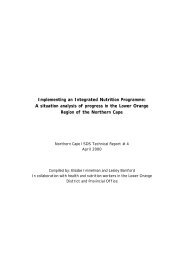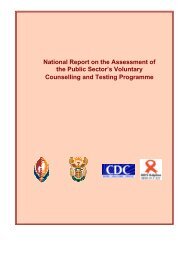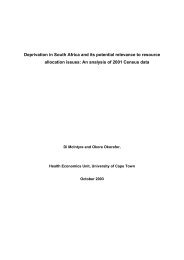SAHR 2007 - Health Systems Trust
SAHR 2007 - Health Systems Trust
SAHR 2007 - Health Systems Trust
You also want an ePaper? Increase the reach of your titles
YUMPU automatically turns print PDFs into web optimized ePapers that Google loves.
The role of intermediaries<br />
Intermediaries play an important role in the collection,<br />
transmission and quality of health information in the private<br />
sector. Figure 2 illustrates the flow of personal health information<br />
in the private health care environment. The specific<br />
role played by each intermediary in the flow of health information<br />
is outlined.<br />
<strong>Health</strong> care providers<br />
<strong>Health</strong> care providers gather health information from<br />
patients, which include clinical, demographic, administrative<br />
and financial information. This information is submitted to<br />
medical schemes primarily for purposes of reimbursement.<br />
Clinical information is also shared with other health care<br />
providers who form part of the health care team (through<br />
referral processes), for purposes of continuity of care.<br />
According to the National <strong>Health</strong> Act all patients receiving<br />
treatment at a health establishment must receive a discharge<br />
report (written or verbal). The Regulations to the Act are to be<br />
finalised soon.<br />
<strong>Health</strong> care providers such as hospital groups, pathologists<br />
and radiologists have their own health information systems<br />
which operate independently from other sub-systems within<br />
the private health information system. The fragmented nature<br />
of the various sub-systems has the potential of limiting the<br />
ability to develop a fully integrated private health information<br />
system to provide comprehensive information on relevant<br />
health care measures.<br />
Practice Management Software companies<br />
Practice Management Software (PMS) enables health care<br />
providers to collect, store, retrieve and transmit information<br />
electronically to medical schemes and administrators. Most<br />
health care providers use different practice management<br />
systems with different capabilities as there is currently no<br />
standardised format.<br />
Data transmission companies<br />
Data transmission companies provide a platform for transmission<br />
of claims from health care providers to medical<br />
schemes and administrators. Some of the data transmission<br />
companies provide online real-time management of health<br />
care transactions. They play a crucial role in conducting<br />
data quality checks on all incoming data and facilitating<br />
the application of benefit entitlements and limitations on<br />
medical scheme beneficiaries.<br />
Managed care organisations<br />
The conduct of managed care entities in the medical scheme<br />
environment is authorised by the CMS through an accreditation<br />
process. 10 All managed care entities in the country are<br />
legally obliged to operate through contracts with medical<br />
schemes.<br />
Generally, managed care entities contribute to the efficiency<br />
and effectiveness of medical schemes by focusing on the<br />
clinical and financial risk management of the scheme. This<br />
is achieved through intervention tools such as protocols,<br />
formularies, provider networks and disease management<br />
programmes. There are different managed care models<br />
ranging from disease managed programmes to integrated<br />
delivery models.<br />
All managed care organisations require clinical and financial<br />
information in order to conduct their business effectively.<br />
In turn, they are required to provide accurate, reliable and<br />
appropriate information to the medical schemes so that their<br />
performance can be assessed. Information management,<br />
data integrity, confidentiality and security are critical aspects<br />
of this process.<br />
Medical schemes<br />
In the execution of their responsibilities, medical schemes<br />
collect personal health information from a beneficiary,<br />
which is processed, stored and transmitted as an individual<br />
beneficiary record. This single record, together with records<br />
of other members or beneficiaries of the medical scheme,<br />
constitutes a data base of clinical, financial and administrative<br />
information. When combined with data from other<br />
medical schemes, the aggregated data provide a broad<br />
perspective of the health status of the medical scheme<br />
population and expenditure on services provided to beneficiaries.<br />
Medical schemes are legally required to submit<br />
statutory returns consisting of aggregate data to the CMS<br />
for purposes of monitoring and evaluating the performance<br />
of medical schemes.<br />
94
















